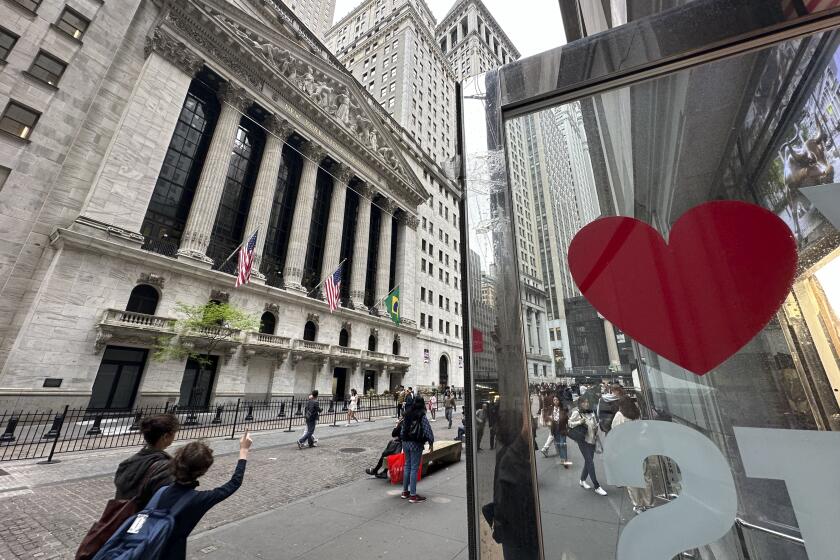Women Business Owners Thriving in the Southland
To some it was a very encouraging sign.
At the recent Governor’s Conference on Women in Business held in Los Angeles that drew nearly 2,000 women, hardly anyone was wearing “the uniform”--the ubiquitous dark business suit with a white blouse and bow of the late 1970s and early 1980s.
“I was delighted,” said Lee Eiseman, a color consultant who conducted seminars on dress and color at the fourth annual conference. “To me it reflected the fact that there are a lot of women who are getting away from the dress-for-success, starched, hard-edged style.”
“I think there’s a new confidence,” said Eiseman, executive director of Pantone Color Institute, a nonprofit color think tank in Woodland Hills. “Women are feeling that to be successful they don’t have to be clones of men in a business setting anymore.”
As statistics tell the tale, more and more women are becoming successful in business.
Women own 28% of American small businesses today, compared to 5% only 15 years ago, according to a report released in July by the bipartisan House Small Business Committee. They are opening businesses at twice the pace of men and are expected to own half of U.S. firms by the year 2000.
But the same study found that women face discrimination in getting government contracts and loans to run their businesses.
Southern California and the state as a whole are a hotbed of entrepreneurial activity, housing more women-owned businesses than anywhere else in the nation.
“Women now are better educated and more experienced in business” and therefore are striking out on their own more, said Carol Crockett, director of the U.S. Small Business Administration’s Office of Women’s Business Ownership.
For some women it is a matter of survival, she said. “There are a lot of women who are single heads of households who simply can’t make it as the manager of a household and a full-time employee,” she said.
Anaheim business broker Jackie Fries said she is selling more businesses to women and an increasing number of them are untraditional companies, not the normal service firms and retail operations that women have headed for in the past. Many of the women she sees, Fries said, have become discouraged in the corporate world when they hit a “glass ceiling” above which they cannot rise.
Operated Out of Home
Women entrepreneurs tend to be younger than men who own small businesses and they generally have less management experience, according to a survey of business owners by the U.S. Census Bureau, which was released last year. (The survey is based on 1982 data, the most recent available.)
More businesses owned by women are operated out of the home than are those by men, and women entrepreneurs are more likely to be divorced or widowed than are men, the survey found.
About one of every four firms run by women are only one to two years old, and many of those businesses are part time for women who hold down other jobs or are running a home, Crockett said. That is reflected by the fact that in the 1982 business census women owned about 25% of U.S. companies, excluding large corporations, but they took in only 10% of business receipts, she said.
“You often hear the accusation that women don’t know how to run businesses as effectively as men and I don’t think that’s true,” she said. “They just don’t have the time to put into it.”
For Oralia Michel, starting her own company with another woman in 1984 was simply a matter of doing for herself what she had done for others for years.
“In the last four years when I was employed I definitely made a lot of money for the company and I realized it was because of my drive and motivation,” said Michel, who now runs a public relations and event planning firm bearing her own name.
“We started on a shoestring,” said Michel, who still operates her company out of her West Covina home. “Our biggest investment was business cards and stationery and our own talents.”
More Difficult Job
For women who start their own companies, discrimination is still a factor and most federal attempts to halt it have been “superficial, unimaginative and lacking in long-term commitment,” the House Small Business Committee found. The report identified a lack of management training and technical assistance, lack of access to capital and problems getting government contracts and subcontracts as principle problems for women entrepreneurs.
“Women have had to work harder, wait longer, manage with fewer dollars and be content with smaller operations just to maintain their present levels of independence and business success,” the report concluded.
But a recent study by the National Federation of Independent Business, a business group that represents small companies, disputes the credit issue. The survey found that male and female business owners are treated alike in their banking relationships when other factors concerning the businesses were the same.
“No evidence could be found supporting the view that women business owners are systematically discriminated against in the credit markets,” the report stated. The only exception, the report said, is that women more often than men were required to have someone else co-sign for their loan but that the ultimate decision on the loan request or the terms of the loan were not affected by gender.
But a sampling of women entrepreneurs found that one of their biggest problems was getting a loan.
“The financing was hard. . . . It was a tap dance,” said Margaret F. Eddy, a San Diego financial planner. “You were treated like a leper.”
Without credit, Eddy said, she had to pay cash for everything.
Found Right Bank
“My business is 10 years old. I’ve talked about it for 10 years,” said Penny L. Kerry, president of PNI Omnitects, a San Francisco architecture and design firm. “They say the business loan problems have diminished for women. It’s nonsense.”
Angela Franklin, co-owner of Professional Reliable Nursing Service, a Stockton-based home nursing service, said she was lucky to find a small bank that was just starting out and was interested in funding new companies.
But Kerry said she worries that deregulation and the easing of restraints on interstate banking will mean that big banks will buy the small lending institutions where many women entrepreneurs get their funding.
“You’re going to be dealing with Citicorp and Manny Hanny (Manufacturers Hanover Bank) and, believe me, they have no room in their portfolio for us,” she said.
For Asian women, credit is much less of a problem, said Lynne Choy Uyeda, who owns a Los Angeles advertising firm called Lynne Choy Uyeda & Associates. That is because the Asian community has developed several unconventional methods of financing such as family lending associations, private credit unions and loan clubs, in which members contribute to and bid for the loan pot. Many of these organizations are headed by women, she said.
“Women are going to these loan clubs with nothing more than their expertise and their honor,” she said.
Success in business can exact a personal cost, many women said.
Kerry said she and her then husband started separate businesses within a month of each other. “His failed and mine succeeded, and it cost the marriage.”
Or as one woman entrepreneur who is the mother of two quipped: “To be successful, you have to be willing to let your children starve.”
STRENGTH IN SERVICES
Most of the women-owned businesses in Los Angeles County in 1982, the latest year for which there are reliable statistics, were in the service and retail industries.
Industry Companies Sales Services 61,798 1,365,720 Retail trade 26,530 1,133,183 Finance, insurance & real estate 11,838 291,192 Other 8,969 184,252 Manufacturing 2,736 261,275 Construction 1,934 145,610 Transportation & public utilities 1,574 110,944 Agricultural services 1,016 37,671 Wholesale trade 1,080 259,671 Total 117,475 $3,789,518
Source: U.S. Census Bureau






